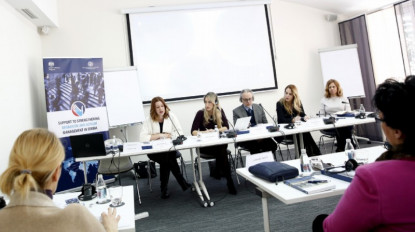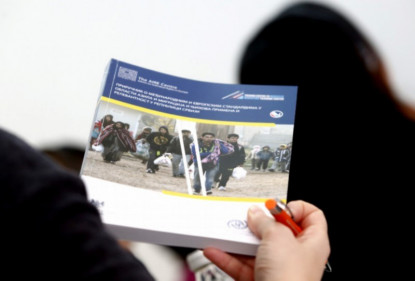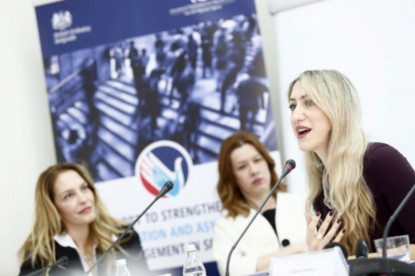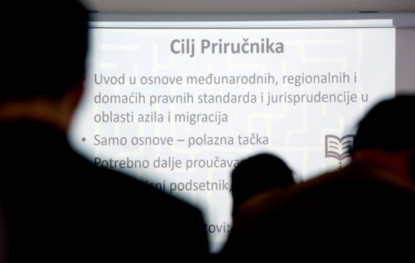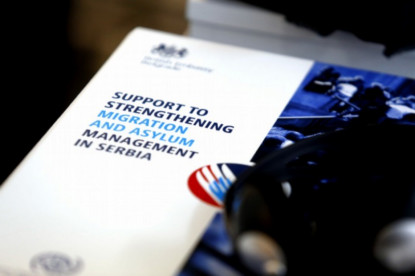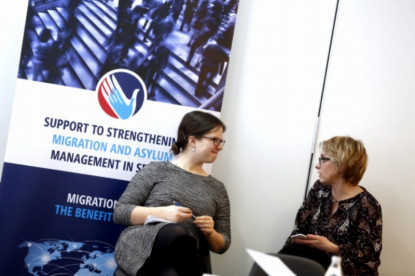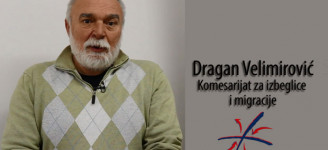Praise for the Manual and the Online Course on international and European standards related to asylum and migration
The Manual on International and European Standards related to asylum and migration and its online version were presented in the full conference hall of the Envoy hotel, in the presence of representatives of relevant state bodies, international organisations, the NGO sector and academia. The event was ceremoniously opened by Donatela Bradic, Regional Manager of International Organisation for Migration.
The Manual was presented during the first segment of the event, moderated by Biljana Braightwaite, AIRE Centre’s Program Manager for Western Balkan, Editor of the Manual and the co-author of the Online Course. The Manual was then presented in detail by Markella Papadouli, lecturer at the London South Bank University, AIRE Centre’s Project Manager and one of the authors of both the Manual and Online Course. She talked about the Manual’s objectives, structure, methodology and content.
After the official presentation of the Manual, the discussion followed on the challenges met by the professionals working within the migration and asylum management system and on the benefits the Manual would bring to their work. Zorica Djokic Milosavljevic, Head of the Republic of Serbia Asylum Commission, and Ivana Krstic, professor of the Belgrade University Faculty of Law, member of the Asylum Commission and one of the Manual’s authors, took part in the discussion.
The second segment of the event aimed to present the online course on international and European standards related to asylum and migration, and the importance these standards have for the steps taken by responsible bodies in the Republic of Serbia. The workshop was moderated by Markella Papadouli and Bojana Cuckovic, assistant professor of the Belgrade University Faculty of Law and the co-author of the Manual. At the beginning of the workshop, the basic information on the course was presented, as well as its objectives, potential participants, advantages of the Online Course compared to the Manual, etc.
The visual presentation of the course on the online platform of the Migration Traning Centre was organised in order to clarify the course to potential participants, while the latter half of the workshop was devoted to presenting the topics covered by the first chapter of the course. As each chapter is divided into two independent segments – with the first dealing with international standards and the relevant case law of the European Court for Human Rights, and the second focused on the legal framework of Serbia – Markella Papadouli addressed the participants expertly and thoroughly, informing them about the structure of those international standards related to asylum.
Assistant professor Bojana Cuckovic presented the second segment of the first chapter, related to the legal framework of the Republic of Serbia, discussing the importance of respecting international standards and enforcing the European Convention on Human Rights in the area of asylum and migration. The provisions of the Constitution of the Republic of Serbia regulating the international law status within the Serbian legal system were analysed, as well as the importance of the case law of international institutions monitoring the enforcement of international treaties on human rights.
The speakers emphasised that competent bodies of the Republic of Serbia should be obliged to invoke the practice of international institutions, specifically of the European Court for Human Rights, and engage in monitoring. Interpretation and enforcement of domestic law are neither right nor complete without consulting the provisions of relevant international treaties ratified by Serbia – especially the Convention Relating to the Status of Refugees and the European Convention on Human Rights.
During the last segment of the workshop, the participants were informed about the testing process. They were registred on the website and received answers to numerous questions relating to the evaluation of the acquired knowledge and the issuing of certificates after the tests are successfully passed.
The closing of the workshop was devoted to participants’ comments and suggestions. Milenka Milosevic, Director of the Asylum Office of the Republic of Serbia, who participated in the event together with the employees of the Office, praised the organisers. UNHCR’s Dusan Aralica, consulting editor of the Manual, noted that the Manual deserves to find its place on the desk of every civil servant and state official working on asylum and migration issues.
All the impressions of the event were truly positive and rewarding, and the discussions on the Manual and the Online Course continued in a pleasant atmosphere after the workshop was concluded.





